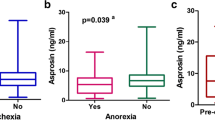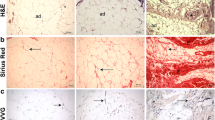Abstract
Purpose
Adipocytokines are adipocyte-secreted hormones associated with some malignancies. It has been reported that the impaired response of adipocytokines to body weight loss may play a role in the pathogenesis of cancer-induced cachexia. We investigated the association between adipocytokines with squamous cell carcinoma of the esophagus (SCCE).
Methods
The levels of body mass index (BMI) and adiponectin, leptin, resistin, visfatin and C-peptide in the blood at diagnosis were measured in 117 SCCE patients and 117 age- and sex-matched controls. Logistic regression models were employed to estimate odds ratio. One-way analysis was performed to examine the prevalence of variables between two or more groups. A non-parametric Spearman correlation test was conducted to examine the associations between BMI and other variables.
Results
Adiponectin and BMI levels were significantly lower, and resistin level was significantly higher in the patients on multivariate analysis (P = 0.01, <0.01 and <0.01 respectively). BMI gradually decreased with stage progression, and resistin level gradually increased with stage progression (P < 0.01 for both). The inverse correlation between BMI and adiponectin was comparatively strong in the controls, but was weak in the patients. Leptin showed comparatively strong correlation with BMI in the controls, but was weakly correlated in the patients. The correlation between BMI and resistin or C-peptide was demonstrated weakly only in the controls, and visfatin did not correlate with BMI.
Conclusions
Resistin may be a biomarker for the progression of SCCE. In addition, the impaired responses to body weight loss of adiponectin and leptin in the patients with SCCE were suggested.
Similar content being viewed by others
References
Arita Y, Kihara S, Ouchi N, Takahashi M, Maeda K, Miyagawa J, Hotta K, Shimomura I, Nakamura T, Miyaoka K, Kuriyama H, Nishida M, Yamashita S, Okubo K, Matsubara K, Muraguchi M, Ohmoto Y, Funahashi T, Matsuzawa Y (1999) Paradoxical decrease of an adipose-specific protein, adiponectin, in obesity. Biochem Biophys Res Commun 257:79–83
Calle EE, Thun MJ (2004) Obesity and cancer. Oncogene 23:6365–6378
Chia VM, Newcomb PA, Lampe JW, White E, Mandelson MT, McTiernan A, Potter JD (2007) Leptin concentrations, leptin receptor polymorphisms, and colorectal adenoma risk. Cancer Epidemiol Biomarkers Prev 16:2697–2703
Dalamaga M, Karmaniolas K, Nikolaidou A, Chamberland J, Hsi A, Dionyssiou-Asteriou A, Mantzoros CS (2008) Adiponectin and resistin are associated with risk for myelodysplastic syndrome, independently from the insulin-like growth factor-I (IGF-I) system. Eur J Cancer 44:1744–1753
Dalamaga M, Karmaniolas K, Panagiotou A, Hsi A, Chamberland J, Dimas C, Lekka A, Mantzoros CS (2009) Low circulating adiponectin and resistin, but not leptin, levels are associated with multiple myeloma risk: a case–control study. Cancer Causes Control 20:193–199
Fantuzzi G (2005) Adipose tissue, adipokines, and inflammation. J Allergy Clin Immunol 115:911–919 quiz 920
Giovannucci E (2001) Insulin, insulin-like growth factors and colon cancer: a review of the evidence. J Nutr 131:3109S–3120S
Ishikawa M, Kitayama J, Kazama S, Hiramatsu T, Hatano K, Nagawa H (2005) Plasma adiponectin and gastric cancer. Clin Cancer Res 11:466–472
Jamieson NB, Brown DJ, Michael Wallace A, McMillan DC (2004) Adiponectin and the systemic inflammatory response in weight-losing patients with non-small cell lung cancer. Cytokine 27:90–92
Kerem M, Ferahkose Z, Yilmaz UT, Pasaoglu H, Ofluoglu E, Bedirli A, Salman B, Sahin TT, Akin M (2008) Adipokines and ghrelin in gastric cancer cachexia. World J Gastroenterol 14:3633–3641
Kumada M, Kihara S, Ouchi N, Kobayashi H, Okamoto Y, Ohashi K, Maeda K, Nagaretani H, Kishida K, Maeda N, Nagasawa A, Funahashi T, Matsuzawa Y (2004) Adiponectin specifically increased tissue inhibitor of metalloproteinase-1 through interleukin-10 expression in human macrophages. Circulation 109:2046–2049
Kumor A, Daniel P, Pietruczuk M, Malecka-Panas E (2009) Serum leptin, adiponectin, and resistin concentration in colorectal adenoma and carcinoma (CC) patients. Int J Colorectal Dis 24:275–281
Nakajima TE, Yamada Y, Hamano T, Furuta K, Gotoda T, Katai H, Kato K, Hamaguchi T, Shimada Y (2009) Adipocytokine levels in gastric cancer patients: resistin and visfatin as biomarkers of gastric cancer. J Gastroenterol 44:685–690
Pannacciulli N, Vettor R, Milan G, Granzotto M, Catucci A, Federspil G, De Giacomo P, Giorgino R, De Pergola G (2003) Anorexia nervosa is characterized by increased adiponectin plasma levels and reduced nonoxidative glucose metabolism. J Clin Endocrinol Metab 88:1748–1752
Rubenstein JH, Dahlkemper A, Kao JY, Zhang M, Morgenstern H, McMahon L, Inadomi JM (2008) A pilot study of the association of low plasma adiponectin and Barrett’s esophagus. Am J Gastroenterol 103:1358–1364
Stattin P, Lukanova A, Biessy C, Soderberg S, Palmqvist R, Kaaks R, Olsson T, Jellum E (2004) Obesity and colon cancer: does leptin provide a link? Int J Cancer 109:149–152
Wang Y, Lam KS, Xu JY, Lu G, Xu LY, Cooper GJ, Xu A (2005) Adiponectin inhibits cell proliferation by interacting with several growth factors in an oligomerization-dependent manner. J Biol Chem 280:18341–18347
Wei EK, Giovannucci E, Fuchs CS, Willett WC, Mantzoros CS (2005) Low plasma adiponectin levels and risk of colorectal cancer in men: a prospective study. J Natl Cancer Inst 97:1688–1694
Wolf I, Sadetzki S, Kanety H, Kundel Y, Pariente C, Epstein N, Oberman B, Catane R, Kaufman B, Shimon I (2006) Adiponectin, ghrelin, and leptin in cancer cachexia in breast and colon cancer patients. Cancer 106:966–973
Wolfe BE, Jimerson DC, Orlova C, Mantzoros CS (2004) Effect of dieting on plasma leptin, soluble leptin receptor, adiponectin and resistin levels in healthy volunteers. Clin Endocrinol (Oxf) 61:332–338
Wolk A, Gridley G, Svensson M, Nyren O, McLaughlin JK, Fraumeni JF, Adam HO (2001) A prospective study of obesity and cancer risk (Sweden). Cancer Causes Control 12:13–21
Yang WS, Lee WJ, Funahashi T, Tanaka S, Matsuzawa Y, Chao CL, Chen CL, Tai TY, Chuang LM (2001) Weight reduction increases plasma levels of an adipose-derived anti-inflammatory protein, adiponectin. J Clin Endocrinol Metab 86:3815–3819
Yokota T, Oritani K, Takahashi I, Ishikawa J, Matsuyama A, Ouchi N, Kihara S, Funahashi T, Tenner AJ, Tomiyama Y, Matsuzawa Y (2000) Adiponectin, a new member of the family of soluble defense collagens, negatively regulates the growth of myelomonocytic progenitors and the functions of macrophages. Blood 96:1723–1732
Acknowledgment
This work was supported by the Ministry of Health, Labor and Welfare of Japan.
Author information
Authors and Affiliations
Corresponding author
Rights and permissions
About this article
Cite this article
Nakajima, T.E., Yamada, Y., Hamano, T. et al. Adipocytokines and squamous cell carcinoma of the esophagus. J Cancer Res Clin Oncol 136, 261–266 (2010). https://doi.org/10.1007/s00432-009-0657-6
Received:
Accepted:
Published:
Issue Date:
DOI: https://doi.org/10.1007/s00432-009-0657-6




